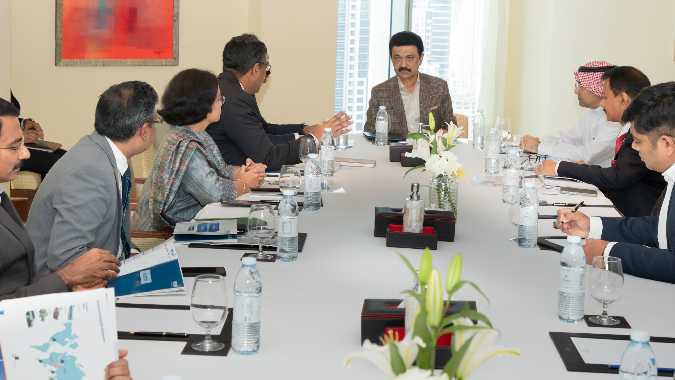Read in : தமிழ்
The Dubai visit of Tamil Nadu Chief Minister MK Stalin succeeds then CM Edappadi’s visit in 2019. They show that Tamil Nadu continues to have a worthwhile growth story investment pitch and there is a policy continuity.
Stalin’s visit coincided with the World Expo 2020, which is now drawing to a close in Dubai after six months. The latest figures reveal that around 17 lakh people have already visited the India Pavilion at the Expo. It showcased an enormous opportunity to exchange ideas, knit ventures, and chart a long-term future course of action. Several Indian states lined up throughout the Expo to make their presence felt, and it was only appropriate that a Tamil Nadu delegation arrived at some stage.
The Stalin visit also came close to the India-UAE Comprehensive Economic Partnership Agreement (CEPA), which will simplify customs procedures, reduce logistics costs, and open new opportunities for professional services. Stalin’s visit interspersed with significant deals besides the usual protocols and a handful of community engagements.
The retail thrust
The most prominent was the Abu Dhabi-quartered Lulu Group confirming ₹3,500 crore investment in Tamil Nadu. The ₹7.4 billion retail conglomerate pledged to set up shopping malls, hypermarkets, and food processing & logistics centers. As per the MoU, the first shopping mall will come up in Chennai by 2024, while the first hypermarket is expected to open by this year-end in the Laxmi Mills compound of Coimbatore.
Lulu will also set up food processing and logistics centers to procure and process agri-products for exports to Middle Eastern countries. A high-level delegation from Lulu will soon visit the state to finalize locations and related formalities. “We aim to provide more than 15,000 direct and indirect job opportunities to Tamil youth in the next three years,” Yusuffali MA, Chairman of Lulu Group, said.
A ‘healthy’ pitch
The other significant announcement was made by Aster DM Healthcare, one of the largest integrated healthcare providers in the Gulf Cooperation Council (GCC) and India, which signed an MoU with Tamil Nadu to set up its facilities in the state. The MoU proposed an investment of ₹500 crore in hospitals, pharmacies, and laboratories in the state to help provide quality and affordable healthcare and generate 3,500 jobs.
The MoU was presented by Dr. Azad Moopen, Founder Chairman and Managing Director, Aster DM Healthcare, who met Chief Minister Stalin during his Dubai visit. In India, Aster has a presence in the southern and western states, with its current investment at approximately ₹3,000 crore.
The other significant announcement was made by Aster DM Healthcare, one of the largest integrated healthcare providers in the Gulf Cooperation Council (GCC) and India, which signed an MoU with Tamil Nadu to set up its facilities in the state.
The Palaniswami era
Tamil Nadu made investment pitches in the UAE much before Stalin landed on its shores. Before the Covid-19 pandemic hit with enormous ferocity, September 2019 to be precise, an investors’ roundtable was held in Dubai. Then Tamil Nadu Chief Minister, Edappadi K Palaniswami, addressed the meeting, sharing the space with the Dubai-based Business Leaders Forum members, seeking foreign investments for the state’s megaprojects.
On that occasion, CM Palaniswami said his state has been taking initiatives to promote e-vehicle manufacturing, electronics, hardware and software, food processing, aircraft maintenance, and repair and overhaul (MRO) facilities. “I am happy that the business community in the UAE and the investors here are very keen to know more about our offerings for investment,” Palaniswami said.
During that visit, Tamil Nadu was trumpeted as a leader in industrial output and with a highly developed industrial ecosystem. Its strength in sectors such as automobiles, auto components, textiles, leather, light and heavy engineering, pumps and motors, electronic software and hardware were highlighted.
An FDI destination
Presenting the projects at the September 2019 meeting, then Tamil Nadu Chief Secretary, K Shanmugam, said the state attracted ₹2,984.8crores of FDI from April 2000 to March 2019, making it the fourth-largest FDI destination region in India. “We have taken up a series of measures to simplify and rationalize the regulatory processes (registration and inspection processes) by deploying information technology to make governance simpler, responsive, transparent, accountable, and efficient.”
The change of government in Chennai has only reinforced the state’s claim to attract investment. And the process should continue irrespective of who the party or the individual is in power.
The BLF pitching session highlighted some of Tamil Nadu’s attributes for investment. The state’s “conducive business environment” was attributed to incentives like tax refunds, capital subsidies, a highly-skilled workforce, and a quality power supply. It was also claimed that its state-of-the-art infrastructure facilities with six airports, four large seaports, and reputation for efficiency made Tamil Nadu the choice of investors.
Tamil Nadu was then the second-largest state economy in India, contributing 8.4 percent to the nation’s GDP. It was an industrial powerhouse with a strong and diverse infrastructural base. Whether Stalin returns to Dubai as chief minister or not, Tamil Nadu will reserve and reinforce its right to seek investments.
( Ehtesham Shahid is a senior Indian journalist based in the UAE. He tweets @e2sham )
Read in : தமிழ்











